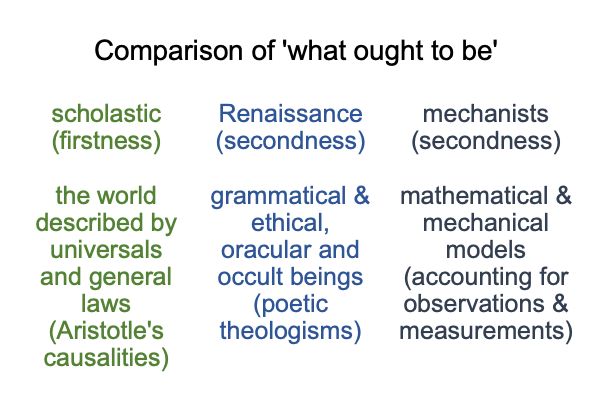0055 In standard tales of the birth of science, mechanical philosophers face off against recalcitrant scholastics. These scholastics cling to a dozen or more causalities, all logically derived from Aristotle’s four causes and all discussed in a dead language: Latin. Do I see a small flaw that has become a large impediment?
Redpath adds a twist. Mechanical philosophers also contend with Renaissance humanists, who propose a systemic vision of a world that can neglect logic.
0056 Perhaps, the contest is thrown at the start.
A little logic easily overthrows no logic at all.
Here are the three expressions of what ought to be for the scholastic, Renaissance and empirio-schematic judgments.

0057 Firstness is the realm of possibility, so Aristotle’s causalities have the quality of guesses, even though they are very good guesses. In particular, final and formal causalities are entangled with firstness.
Sometimes, there remains only one possibility standing, after all other possibilities are exhausted. This offers some comfort, but does allow final and formal causations to be reduced to causations that typify secondness, such as material and instrumental causes. Firstness never achieves certainty.
Secondness is the realm of actuality. Renaissance and mechanical philosophers offer the quality of certainty, even though the former neglects logic and the latter offers only the logics of mathematics and mechanics.
Hmmm. I suspect this may be a leap. But, do the oracular and occult beings of the Renaissance sort of look like final and formal causations? And, do the models of the mechanical philosophers have the same categorical flavor as material and instrumental causes?
0058 Over a few generations, the mechanical philosophers eliminate the scholastic tradition, to the point where many modern histories of philosophy jump from Augustine to the Italian Renaissance. The scholastic tradition gets no coverage.
What about Renaissance humanists?
Do the mechanical philosophers defeat the Renaissance humanists, as they do the medieval scholastics?
Or, do the mechanical philosophers subjugate the Renaissance humanists?
0060 If it is the latter, I wonder, “What does this subjugation imply?”
